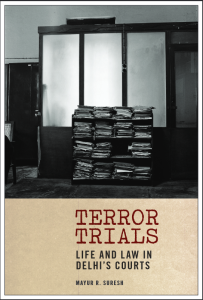Faculty Seminar | Terror Trials: Life and Law in Delhi’s Courts
Conference Hall, Ground Floor, Training Centre, NLSIU
Wednesday, December 20, 2023, 4:00 pm
 In this week’s faculty seminar, Dr. Mayur Suresh, Senior Lecturer in Law, SOAS, will be presenting on his book titled “Terror Trials: Life and Law in Delhi’s Courts” on Wednesday, 20th December, 2023. Dr. Manpreet Dhillon, Academic Fellow will be the discussant.
In this week’s faculty seminar, Dr. Mayur Suresh, Senior Lecturer in Law, SOAS, will be presenting on his book titled “Terror Trials: Life and Law in Delhi’s Courts” on Wednesday, 20th December, 2023. Dr. Manpreet Dhillon, Academic Fellow will be the discussant.
Author bio
Dr Mayur Suresh is a Senior Lecturer in Law at SOAS, University of London and has taught at SOAS since 2015. He graduated from NLSIU in 2004. His book Terror Trials: Life and Law in Delhi’s Courts (Fordham University Press, 2023) is derived from an ethnography of terrorism trials in Delhi. In 2023 Mayur was awarded the Leverhulme Research Leadership Award for a project titled The Social Life of Law in Authoritarian Contexts through which he will build a research team to do ethnographic and quantitative research into the state’s use of law to reconstitute society.
Abstract
This book is an ethnography of terrorism trials in courts in Delhi, India. Amidst the grinding terror trials—which are replete with stories of torture, illegal detention and fabricated charges—I found letters written to judges appealing for justice, an extensive knowledge of legal procedure, friendships with police officials, a cautious faith in the courts, and a deep sense of betrayal when this trust was belied. By looking at the everyday life of the law in these courts, I argue that legal technicalities enable forms of life to emerge in the courtroom. The book shows that though seemingly mundane, legal technicalities are fraught and highly contested and acquire urgent ethical qualities in the life of a trial: Legal language becomes a question of a form of life, the file becomes a space in which the world can be made or unmade, the petition a way of imagining a future, and investigative and courtroom procedures enable the unexpected formation of close relationships between police and terror-accused. I argue that in attending to the ways in which legal processes are made to work—through legal language, through files and the everyday interactions among lawyers, judges, accused terrorists, and police—we are offered a way of understanding how human expressiveness, creativity and vulnerability emerge through the law.

